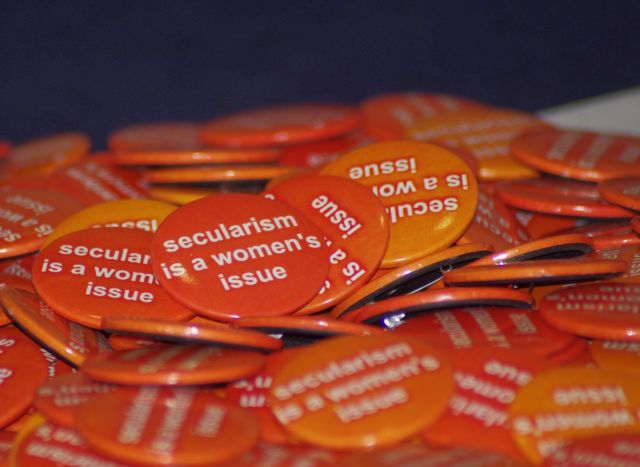

The announcement of the world’s first Sikh ‘Court’ in London in April 2024 – and due to open for business on 1 June 2024 – demands our urgent attention.
For many years, some of us have campaigned against the growth of Sharia councils and the creation of the Muslim Arbitration Tribunal because we recognise that all such religious systems of dispute resolution, by their very nature, are tied to a rising politics of religious fundamentalism that targets the rights and freedoms of women. The Sharia councils and the Arbitration Tribunal were, of course, following the model of the established Jewish Beth Din courts, and our key concern was the very real possibility that other minority religions would follow to insist that their own personal legal orders be similarly accommodated by the state.
It has not taken long for our fear to become a reality. To the list of Muslim sharia councils and tribunals and Jewish Beth Dins that already exist, we can now add the Sikh ‘Court’, and we can be sure that the Hindus cannot be far behind.
As women of diverse minority backgrounds – having made great strides in challenging all forms of violence against women in the struggle for our self-determination – we are alarmed by the unchecked growth of such parallel legal systems in the UK. The use of religious personal laws to regulate minority women’s lives is not only discriminatory; it is also immensely harmful in a context where domestic abuse and related femicides of South Asian and other minority women remain persistently high, becoming more and more audacious in character.
Witness, for example, the brutal assault on Ambreen Fatima Sheikh in Huddersfield, left in permanently vegetative state after she was forced to take anti-diabetes medication and doused in a corrosive substance in 2015; the murder of Fawziyah Javed who was pushed off a cliff in Edinburgh when she was 17 weeks pregnant in 2021; or the case of Kulsuma Aktar who was stabbed to death while pushing her baby son in a pram in a Bradford shopping mall in 2024. All of these attacks occurred in the context of the ultra-patriarchal dynamics of coercion and control facilitated by religious and community leaders who blatantly fail to publicly condemn such atrocities.
The Sikh ‘Court’ was set up pursuant to the Arbitration Act 1996, ostensibly to counter the supposed ‘lack of expertise’ in secular courts to ‘understand’ Sikh cultural and religious sensibilities when resolving family and civil disputes. Comprised of around 30 magistrates and 15 judges – many of whom are women – the ‘Court’ will use a combination of mediation and arbitration to preside over family and civil disputes in the Sikh community. While acknowledging that Sikhism (like Hinduism but unlike Islam and Judaism) does not have a religio-legal framework of codified rules by which to adjudicate cases, the founders’ intention is clear: to create an order from scratch to rule on matters such as marriage and divorce, residence/contact/custody of children and matrimonial property settlements ‘in line with Sikh religious principles’ as defined by them.
It is asserted that the ‘Court’ was created following discussions with hitherto unnamed Sikh charities and lawyers from across the world. But there has been no transparent and democratic debate or public consultation, particularly with Sikh women, on the need for such a ‘Court’ or on what constitutes Sikh principles. The ‘Court’ was simply proclaimed into existence by Sikh lawyers who have clearly appointed themselves as representative of the Sikh community and as the guardians of its values.
The ‘Court’ presents itself as a formalised and professional, quasi legal body that is willing to adhere to formal legal rules of engagement. However, it is clear that the real objective is to monopolise non-state power in the community to control women.
By way of justification of its existence, a spokesperson for the ‘Court’ pointed to the so-called failure of the secular courts to take account of ‘Sikh’ values in a case concerning a divorced Sikh woman who, as the primary carer of her young son, supported his decision to cut his hair, in defiance of the wishes of his father (her ex-husband). The family court ruled in favour of the mother, but it was heavily criticised by the Sikh ‘Court’ spokesperson for not taking account of the Sikh principle that forbids the cutting of hair.
This take on the case allowed for no reference whatsoever to the wider context of the case: the family’s background and history of relationships, and in particular the reasons for the parents’ divorce, bearing in mind that most South Asian women – including Sikh women – do not entertain even the idea of divorce unless there are allegations of domestic abuse and coercive control. Significantly, it fails to take any account of the reasoning behind the family court’s decision, or indeed any professional assessment of the child’s wishes, feelings and needs as part of the application of the fundamental legal principle that the ‘best interest of the child’ should always be paramount.
This example illustrates clearly that the overriding priority of the Sikh ‘Court’ is to ensure religious compliance in the interest of the father rather than the interest of the child or the mother in any family dispute. To that extent, its stance represents a fight for the preservation of the father’s rights which has echoes of a wider ideological battle being fought by abusive men about how the family courts are biased against them. The all too familiar demand for respect for religious values, regardless of the circumstances, is key to the modus operandi of all religious arbitration systems.
Our concerns have been further underlined by the claim that the Sikh ‘Court’ will address cases involving ‘low-level domestic violence’ as well as issues of ‘anger management, gambling and substance misuse’ through mediation first and foremost, and then – If mediation is unsuccessful and the parties agree – a case can be brought in front of a judge of the Sikh ‘Court’ who can give a legally binding judgment under the Arbitration Act 1996. This is one of the most disturbing aspects of the Court’s operation: it raises questions about how consent is obtained and who defines what is ‘low level’ domestic violence?
Our years of front-line experience tells us that, when religious leaders are involved, cases of domestic and sexual abuse and coercive control are almost always denied or construed as ‘low level’ problems of ‘anger management’ that can be resolved through mediation with a view to reconciling the parties. Far from conducting proper risk assessments or informing women of their rights to protection under the civil or criminal law, they tend to sweep the issues under the carpet, at best, and at worst, they blame women for defying patriarchal authority. Similar concerns were echoed by the Independent Inquiry into Child Sexual Abuse in its 2021 report focussed specifically on religious settings in which it criticised religious authorities – in majority and minority religions alike – for their ‘egregious failings’ in relation to child protection and for covering up cases of child sexual abuse perpetrated by their adherents.
Experience also shows that the vast majority of minority women who use community mediation and arbitration systems do so, not out of choice, but out of social compulsion due to the fear of stigma, isolation and even violent repercussions. Their lack of knowledge of legal rights and alternatives support systems, coupled with delays and hurdles in accessing legal advice and representation, are exploited by religious patriarchs to their detriment. Many recount how they are rendered powerless by a process that ignores and invalidates their needs and wishes. Most are highly critical and distrustful of religious power and its use to accord them lesser social and legal status than men. Far from inspiring confidence and trust, it is a system that forces women to exercise a highly constrained form of agency: to make choices against their interests and in contexts in which the stranglehold of religion has already left them little room for manoeuvre.
Non-state legal orders – of which the Sikh ‘Court’ is the latest addition – have only one objective in mind: to ‘preserve ‘religious values’ and, in particular, the ‘sanctity of marriage’ in which women are expected to play a central role. We know from experience that, had Sikh women in this country been consulted about the need for religious courts, the majority would have drawn a clear separation between religion as personal belief and source of comfort, and religion as the basis for allocating resources and rights in the family.
The Sikh ‘Court’ has claimed that its role is not to supplant but to complement and support a judicial system that is increasingly over- burdened, under resourced and faced with lengthy delays. This is of course true. As part of its austerity drive, the state has been only too eager to divert resources away from what is seen as costly and time-consuming litigation. To this end, successive governments have expressly promoted the use of informal and essentially private mediation services in family matters, both as a cost cutting exercise and as an ideological attack on what is wrongly perceived to be a litigious culture of rights in the UK. Through the decimation of legal aid and welfare services alongside the promotion of multifaith policies, the state has succeeded in emboldening elitist religious and patriarchal power while, at the same time, limiting minority women’s access to the formal and secular legal system: a system which, despite its many flaws, is at least challengeable on questions of accountability, rights and justice.
In this context, right wing religious forces are merely cashing in on the space vacated by the state. The entire project of the Sikh ‘Court’ – like its predecessor models in Islam and Judaism – is indicative of how religion is moving into the void left by the state and is flexing its political muscle, simply because it can do so.
Minority women’s rights are in peril in the UK. Far from reversing the assault on our rights, the state has facilitated the creation of anti-democratic non-state legal orders involving religious arbitration systems that flout domestic and international human rights law. In the process, the entire ethos of protection and prevention underlining the Domestic Abuse Act 2021, like the principles of non-discrimination and equality of opportunity enshrined in the Equality Act 2010, are seriously undermined. Similarly, the principal tenets of the Convention on the Elimination of Discrimination Against Women – that oblige states to eradicate discrimination against women in all matters including relating to marriage and family relations so that they can exercise informed choice – are also violated. And the Istanbul Convention on Violence Against Women – which commits the UK to refrain from condoning or encouraging harmful attitudes, prejudices, gender stereotypes and gender-biased customs or traditions that put women down and treat them as inferior – is thereby compromised.
In effect, the justice gap for minority women has widened and become even more dangerous. We have no choice but to fight back to prevent the Arbitration Act 1996 from being used by religious authorities to undermine the principles of human rights, equality before the law, duty of care, due diligence and the rule of law. We call on the government to take all steps necessary to ensure that these principles are applicable in the private sphere of the family and to all women in all communities. To do otherwise is to allow religious authorities to build yet another rung in support of their attempts to lay the foundation of a regime of sexual apartheid in minority communities.
Project Resist and One Law for All

